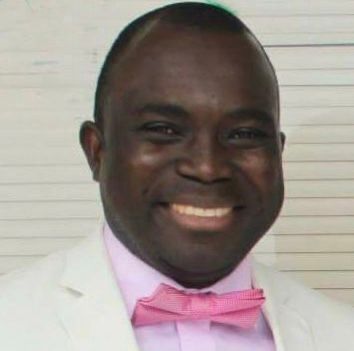Dr. Godwin Agboka
U. S.-based Ghanaian Professor, Dr. Godwin Agboka, has been announced by the globally acclaimed National Council of Teachers of English (NCTE) as the recipient of two scholarly 2023 Conference on College Composition and Communication (CCCC) Technical and Scientific Communication Awards. Professor Agboka also received an Honorable Mention from the NCTE for another publication.
Agboka, Professor of technical communication at the University of Houston-Downtown, won the CCCC Award for Best Original Collection of Essays in Technical or Scientific Communication for the collection (co-authored with Walton), Equipping Technical Communicators for Social Justice Work: Theories, Methodologies, and Pedagogies.
_
The selection committee said, “Walton and Agboka’s edited collection fills a gap in technical communication work focused on social justice, offering compelling examples of how to ethically engage in social justice work as well as frameworks for how to begin new projects in this direction. The collection offers a great balance of breadth versus depth in social justice research and should be essential reading for those in the field preparing to incorporate social justice as a central tenet of technical communication.”
Agboka“The academic field of technical communication is undergoing a social justice turn, which is a significant movement that is opening up the field to inclusive, delegitimized, and diverse approaches to scholarship, teaching, and practice. Yet, although this type of work is burgeoning, many scholars – both emerging and established – have a limited understanding of social justice and how to apply its goals to their teaching, research, and practice,” said the Professor of Technical and Professional Communication in the College of Humanities & Social Sciences.
“This award is important for a couple of reasons: Firstly, it foregrounds the relevance of social justice work, especially in terms of how social justice objectives create the necessary path toward magnifying the agency of disenfranchised or oppressed people. Secondly, with membership of over 4,000, the Conference on College Composition and Communication presents a unique and wider platform for projecting this important work and to bring attention to social justice issues in higher education,” Agboka concluded.
The second award is for Best Article on Pedagogy or Curriculum in Technical or Scientific Communication for the publication, “Curricular Efforts in Technical Communication After the Social Turn,” (co-authored with Isidore Dorpenyo).
When asked how this experience lends itself to his teaching, Dr. Agboka said, “Quality scholarship and scholarly productivity are necessary for effective teaching. My pedagogy is heavily influenced by my scholarship, and my practices demonstrate a strong synergy between my teaching and my research. To be clear, my pedagogy advances equitable teaching and learning practices that seek to reduce systemic inequities as well as enable students to critique systems and enact change through learning content.”
He continued, “My courses empower students to consider the social justice implications of their work, while providing them with job-ready skills for the contemporary workplace. I recently designed a new graduate course, ‘TCOM 6311: Social Justice Issues in Technical and Professional Communication’ to educate students about the role technical communication plays in legitimizing and sustaining injustice and oppression as well as how to take action against injustice. More so, I have recently begun redesigning all my courses to include social justice components.”
Dr. Agboka will be announced as a recipient of both awards on Feb. 17 at the 2023 CCCC Annual Convention.
“I am excited that colleagues in my field are paying attention to the important work that I am doing,” he said. “Not only does this award highlight the relevance of my work, but it also suggests that the sleepless nights and the long hours of research and writing have some value. An important objective of scholarship is impact, and it gives me great joy that what usually starts as a disjointed, nebulous idea grows into something meaningful that will later have tangible impact.”
The CCCC, a constituent organization within the National Council of Teachers of English (NCTE), supports and promotes the teaching and study of composition, rhetoric, and communication skills at the college level, both in undergraduate and graduate programs. With more than 25,000 individual and institutional members worldwide, NCTE is dedicated to improving the teaching and learning of English and the language arts at all levels of education.


